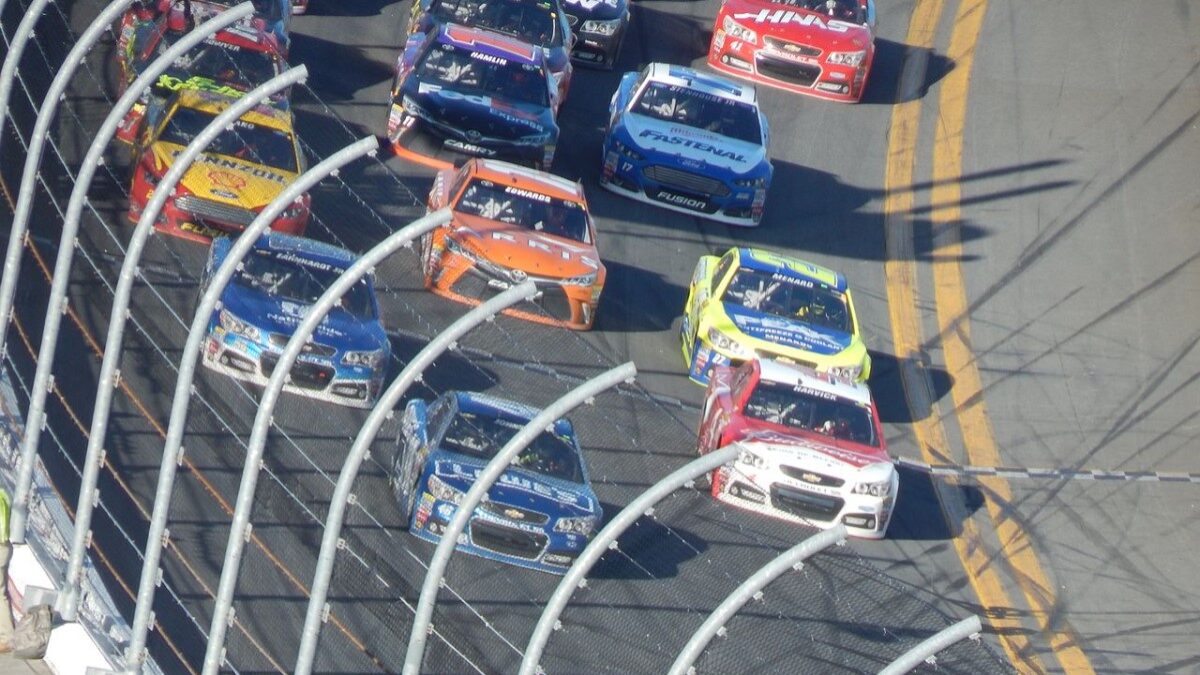This Sunday, stock car racing will begin its 2022 season with an old exhibition race, The Clash, being held at a new venue.
The mix of old and new defines much of NASCAR at present, both on and off the track. Even as the sport rolls out major changes to its on-track product, it has also spent the off-season grappling with how much it wants to appease political trends—and how much it can afford to do so.
New Venue
In some respects, the choice of venue for the exhibition—the Los Angeles Memorial Coliseum—represents a return to NASCAR’s roots. No, the sport hasn’t previously raced inside a venue that has hosted two summer Olympics (with a third scheduled for 2028), two Super Bowls, and a World Series.
But short tracks have long represented the lifeblood and origins of stock car racing. And NASCAR’s longest-running weekly track—Bowman Gray Stadium in Winston-Salem, North Carolina—features a similar configuration to the Coliseum: an asphalt quarter-mile track circling a field often used for football.
Some might question why NASCAR spent an estimated $1 million to create a temporary track. But television partner Fox has spent the past several weeks prominently promoting the novel exhibition venue. If Sunday’s exhibition succeeds, the sport could embark on a “stadium series” in other similar sporting venues—much as the Winter Classic has become a staple of the National Hockey League season since its creation in 2008.
Next Gen Race Car
The Clash will also see the debut of NASCAR’s “Next Gen” race car. The seventh generation of stock car bodies features obvious changes, including forward movement of the numbers on the sides of each car, and bigger wheels and tires. The latter change will majorly affect pit stops, as changing tires will require removing and replacing one center hub rather than five lug nuts.
The most important change associated with Next Gen comes in its assembly. Race teams will buy parts for the cars from approved vendors, rather than fabricating the chassis in-house. NASCAR wanted to get teams out of fabricating bodies to save money, to limit the “arms race” that has seen the best-funded teams, who have more resources to devote towards building cars, obtaining aerodynamic advantages that teams with smaller budgets could not match.
By leveling the financial playing field, NASCAR hopes to attract more sponsors and owners to the sport—people like Michael Jordan and Pitbull, both of whom have gone stock car racing in recent years. That move got an added boost on Tuesday, when a new part-time team funded by former boxer Floyd Mayweather, Jr., said it would attempt to qualify for this month’s Daytona 500. In time, NASCAR also hopes Next Gen could lead other engine manufacturers to return to stock car racing.
New Leftist Politics
Underlying the changes in the sport’s rules and economics are political dynamics. Few people capture that phenomenon more than Brandon Brown, the racer whose first win last October prompted the “Let’s Go Brandon!” meme.
Late last year, Brown announced a sponsorship deal with a new cryptocurrency called LGBCoin. NASCAR officials initially approved the arrangement over Christmas, but supervisors quickly rescinded the approval once they connected the initials of the cryptocurrency and the meme.
NASCAR ultimately issued a policy prohibiting political advertising on race cars. (Campaigns had advertised on stock cars in the past—most notably Donald Trump’s re-election campaign in 2020.) But at the same time, the sport announced a partnership that many conservatives might find distinctly political:
To judge from the sport’s actions, LGBCoin could have gotten approved as Brown’s sponsor, if only it had added a “TQ” to its name.
‘Go Woke, Go Broke?’
Ultimately, Brown found an accommodation that allowed his team—which faced difficulty finding sponsors after his first win, solely because of a meme that Brown had no role in creating—to continue. LGBCoin will sponsor Brown’s appearances away from the track, but its name or logos will not appear on his car during races (depriving the company of its best way to gain visibility).
The sport also faces some difficult decisions as it approaches renegotiation of its television contracts, and ratings cut by more than half since 2005. Series officials undoubtedly hope they can appease the woke sensibilities of corporate America and expand fan interest without offending the sport’s traditionally rural, politically conservative base of support.
But even as NASCAR tries to promote The Clash as emblematic of a quality on-track product, cultural clashes away from the track could keep fans away.









